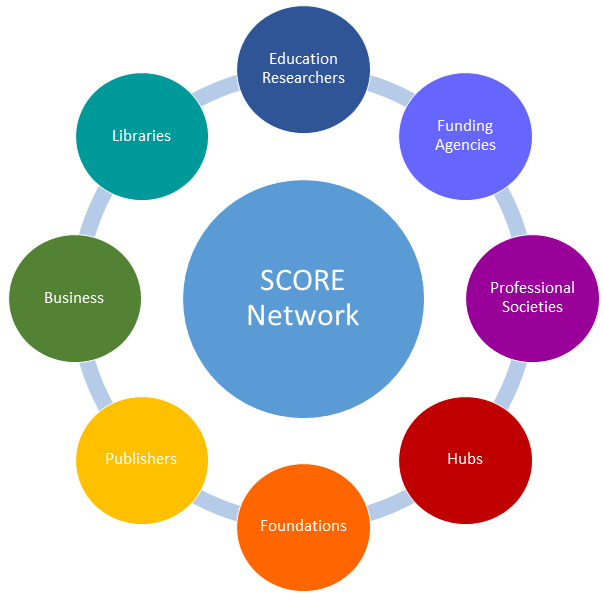The 2021 Northeast Regional OER Summit
The 2021 Northeast Regional OER Summit took place virtually this year from May 24-26 offering a variety of workshops and sessions, and included a regional OER expert-facilitated “genius bar” that ran throughout the conference where participants could drop in at any time to ask questions and engage in informal discussions. The wealth of presentations and panels included building partnerships with students, OER and the coronavirus crisis, a range of digital tools and platforms for open ed, assessment, faculty development, open pedagogy, open education and anti-racism, scaling OER initiatives, and more.
Keynote speakers are often the highlight of a conference, and for this conference that was especially true. Angela DeBarger from the Hewlett foundation was brilliant and inspiring, and when she showed the slide and spoke of the SCORE network and S-JEDI, I shouted to my screen “Hey! She’s talking about us!
But first, Angela talked about mapping the open ecosystem and emphasized that there are many open education communities around the world and asked, how do we connect and create relationships among them? I felt like she’d been reading my mind for the last several months. She spoke of natural ecosystems as models (something that I’ve been reading and writing about). She said, “Ecosystems are fluid and dynamic” and then showed a picture of starlings moving together in beautiful murmurations. But in our world of open education communities, fragmentation is more common. While there are a variety of open ed networks, institutes and programs - most institutions only belong to one. A few have multiple connections, but for most there are strong limitations in time and resources; and there is great variability in who the open ed leaders and champions are, how well supported they are (or not), and leaders can burn out if others don’t step up to participate. She spoke of the need for more integration and coordination like regional compacts between organizations and initiatives; but most importantly (to me anyway), she said this:
Our networks and programs often emphasize the technical over the relational aspects of our initiatives. We refer to people by their roles: “the funder”, “the administrator”, “the librarian”, etc. When we talk about institutionalizing, all of this is dehumanizing and it works against what we are trying to accomplish in our networks. It is PEOPLE, not principles or platforms that do the work. I tweeted this:
I couldn’t have asked for a better set up for the three sessions for which I was a panelist. As the new program director for the CCCOER/OEGlobal Regional Leaders of Open Education Network (RLOE), making connections, forming partnerships and inviting participation into the network was the main focus of the RLOE networking and the RLOE/DOERS partnership sessions. As RLOE in particular is about leveraging open education to address the needs of underserved students, thinking about the human aspects of what it means to be a leader and who should be a leader are critical questions for me as director.
In our SCORE/RIOS session: ‘Reimagining STEM Education: Strengthening Networks, Centering Social Justice, and leveraging the Open Ecosystem’ (panelists: Karen Cangialosi, Carrie Diaz Eaton, Jasmine Roberts and Kaitlin Bonner), we invited participants into discussions around three main questions below. We have more notes from these discussions, but here are some of the highlights:
1) As we invest in Open Education for STEM, Open Science and Open Data, “Open for Whom?” becomes an increasingly urgent question. Why should we invest in an education that is free, but which reinforces oppressive pedagogy and science culture?
-
Open Ed has been the segue to talk with faculty about “all things open”. Faculty can start with open ed and have an aha moment about their entire research and scholarly work - from their research data, to research results and how to make all of that open.
2) How do we transform STEM education to be more collaborative, participatory and accessible, and address a mandate to bring greater racial and social justice to curricula, resources, pedagogy and scientific practice within higher education?
-
Interrogate the scientific process and the dominant epistemologies that inform the process
-
Be sure to cite BIPOC authors and invite BIPOC scholars for reviews to make sure voices are heard
-
Think of ways that we can leverage student knowledge. This can give them a sense of belonging. They will feel a part of STEM instead of just feeling like they are learning about STEM.
3) How do we leverage our existing SCORE leadership network (Sustainability Challenges for Open Resources to Promote an Equitable Undergraduate Biology Education), to expand participation and construct new models for transforming STEM education grounded in the principles of open education, open science, racial justice, equity and inclusivity?
-
Look at how we “train” or “educate” leaders to help bring faculty along. Perhaps we create some sort of approach to training that could ameliorate fear of unknown, threat of “newfangled” approach. Find ways to reward and empower marginalized faculty who feel disempowered.
by Karen Cangialosi
